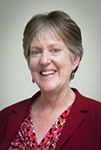
With the upcoming South Australian election in mind, this is a great opportunity to reflect on the benefits of having a strong and robust democracy, and highlight what it means for the work of my office.
Since I started my role as Guardian last year I have been conscious of what a privilege it is to be leading a team entrusted to advocate for some of the most vulnerable South Australians. All children are relatively powerless because they can’t vote for the governments that make the laws that affect them. But children living in state care are often doubly so because they don’t always have ‘natural’ advocates, like birth parents or families, that other kids have.
Robyn Layton QC recognised this in the course of her review into child protection in 2003, Our Best Investment: A State plan to protect and advance the interests of children. Ms Layton recommended establishing a statutory office of Guardian because ‘There is a need to ensure that those children who are most vulnerable and who are under the statutory guardianship of the Minister or otherwise in care away from their parents have their rights articulated and safeguarded….’ She further recommended that ‘The Guardian should report to Parliament and …. proactively check on such children and young persons to ensure their welfare.’
And so the office of Guardian for Children and Young People was established in 2005. The role has grown but it has always been about advocating, monitoring, reviewing, inquiring and advising government – in short, championing the best interests and rights of children and young people in care.
Just as with other monitoring bodies throughout Australia, our reports and advice and advocacy are not always comfortable for the government of the day. It is, after all, our very job to hold government and departments to account on behalf of those who do not have a voice.
No democracy is perfect but I believe we are fortunate that we live in a nation where we have governments willing to respect, and pay for, mechanisms that will hold them to account. This is the ideal of monitory democracy, which developed in the 1940s in the aftermath of atrocities committed by leaders like Hitler and Mussolini, who were initially elected, and popular. Monitory democracy has evolved to keep a check on arbitrary power through continuous public scrutiny of government institutions, underpinned by an awareness and respect for human rights. (Professor John Keane has written extensively about this. See his article The Origins of Monitory Democracy in The Conversation (24 September 2012).
There are twelve Children’s Commissioners and Guardians around Australia and numerous other commissioners (for human rights and ICACs), Ombudsmen and other officers who work to hold power to account without fear or favour. In recent times we have seen Commonwealth government-initiated Royal Commissions into Institutional Responses to Child Sexual Abuse, and the Protection and Detention of Children in the Northern Territory (Don Dale). Here in South Australia we have had the State Child Protection Systems Royal Commission (the Nyland Inquiry) and there have been various recent inquiries into juvenile justice by Australian states. Importantly, the Federal Government has recently ratified the Optional Protocol to the Convention against Torture and Other Cruel, Inhuman or Degrading Treatment or Punishment (OPCAT), which will shine a light into places of detention throughout Australia and hold the States and Commonwealth accountable.
Around the world, in this second decade of the 21st century, we see ostensibly popular but authoritarian rulers on the rise and democratic processes increasingly under threat. As I go about my work as Guardian, I often reflect that neither Putin, in Russia, nor Erdogan, in Turkey, nor a growing number of governments in other places would tolerate the work of my office, let alone fund it.
Let us give thanks for strong democracies – and let us not take them for granted.
